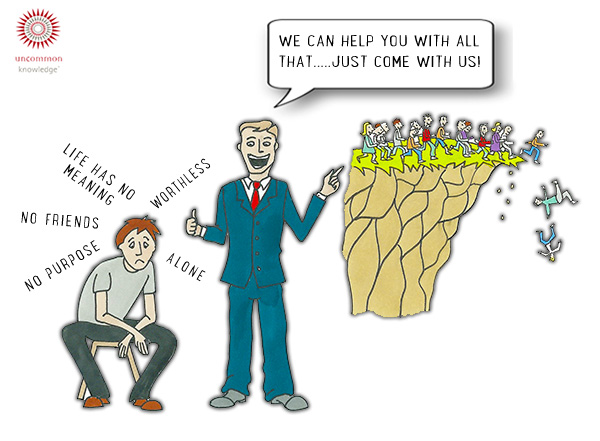Ending Therapy - Is it Time to Fire Your Therapist?
10 questions to tell whether you're a victim of 'emotional entrapment', plus a 6-step escape plan
Here's an important question:
What if your therapist won't let you end therapy? Or at least makes you feel bad if you hint you might bring things to a close.
Suzie looked at me anxiously with big scared eyes.
She spoke quietly, hesitantly, like someone who had only temporarily escaped the clammy clasp of some secret organization with infinite potential to dish out punishment.
"If my therapist knew I was here she'd be furious!" Suzie glanced about her nervously, perhaps half expecting her long time counsellor to leap from behind the couch, seeking retribution.
I was at once reminded of the words of psychologist Joe Griffin: "A good therapist should not leave footprints in the lives of their clients."
What kind of unprofessional boundary transgressing insanity was this?
When therapists won't let go
I wrote an article on my blog aimed at therapists called How to End Therapy with Your Clients, explaining how to gently end therapy once goals have been met. I was struck by a comment on that post from someone who wished to remain anonymous:
"Thanks for this Mark. I have been seeing a therapist for seven years, first for weekly sessions, then when I moved, for weekly phone calls. At times I wanted to end but she often said things like ' oh clients go on for years and years' 'why end , this can be for life'. At times she called me 'family'. She also wants a friendship after therapy.
I realise I got too dependant, but now she has announced she wants to stop being a therapist and stop supporting me. It's destroying me as I never saw it coming and she never gave me any impression of this. I am in such a lot of pain about it, any advice would be welcome, thanks for your article, I think I can see how it 'should' be done!"
Terrifying, you might think. And it is.
But what is disturbing to me is how often this kind of client 'emotional entrapment' seems to happen. How does this happen? How can clients who go for help with sometimes quite straightforward emotional issues be compelled to spend thousands of pounds and many years with a single therapist?
Now I'm going to take a sharp turn, but stick with me, it will make sense…
Brainwashing therapy
Cults are weird, right? I mean, how can people be induced to believe the world will end on a specific date and they alone will be rescued by alien beings in space ships?
But before we judge too harshly let's look at how this might make sense. Cults, and indeed many manipulative human relationships, make sense when we look at human needs.
It's a mistake to assume that cult-like manipulation only happens inside cults, or can't happen between just two people. Because we know it can.
Join us and stick with us… or else!
People join cults when they are feeling vulnerable. 'Vulnerable' means one or more physical or emotional need is not being met, leading to chronic and sometimes desperate feelings of need. In this situation, anything that seems to meet that need becomes compellingly attractive and convincing, regardless of logic or common sense.
This is why many people in cults seem to believe really weird stuff. That is their 'price of admission' for having their emotional/physical needs met.

The attraction of 'love bombing'
Being showered with attention, 'love bombing' as psychologists call it, can be irresistible to someone who has been lonely in their life. A cult, at first, seems to provide many of the human needs. It seems to meet, and more than satisfy, the universal needs for excitement, for status, for feeling special (the 'chosen people'), for feeling part of a community, and so on.
But in the end cults demand more than they give. Cults convince people that only by adherence and loyalty to the cult (and to it alone) can they really be safe and secure. This is why cults cut you off from contact or influence from outside sources. They hate sharing influence.
So cults brainwash people, in part, by seeming to meet all of life's needs in one big overwhelming package. But they also use other highly manipulative techniques, such as sleep deprivation – which makes it harder for people to think clearly – and by continually alternating between providing promise and inflicting fear – which leads to people losing all sense of autonomy and volition.
But that seems a bit heavy, doesn't it? Cults are not people. They are organizations.
That is true, but subtle psychological patterns can become clear when you work backwards from extreme examples. So why am I talking about cults? Because cultishness happens outside of cults.
A cult of two
Consider Suzie's therapist. She didn't want Suzie even talking to other therapists or even her family about her therapy. If anyone wants you to only be influenced by them, that might be a warning sign.
Over many years, Suzie's therapist alternately used both 'promise' – "Stick with this process and one day we'll find the root cause" – and threat – "If you leave therapy things will be bad for you."
What's more, the issue that had originally motivated Suzie into therapy – looking for a cure for her panic attacks – had been all but forgotten by the therapist, who had built no finite or clear goals with Suzie. This is just what happens in cults, in which the original promise of the cult (everlasting life, infinite power, a trip in a flying saucer) never materializes.
Okay, enough about everyday cults. How can people break away from a manipulative or needy therapist?
10 questions to assess your relationship with your therapist
First, ask yourself the following questions:
- Does my therapist try to convince me that therapy has to be long term or 'painful' in order to be effective? (Research tells us the opposite.)
- Is my therapist offering me a service, or am I serving them?
- Does my therapist get angry, or act disappointed or hurt if I don't behave as they want? Does my therapist ever seem jealous or demanding? Does my therapist use emotional blackmail to make me feel guilty?
- Does my therapist switch inexplicably between sweet kindness and sudden anger? Does it sometimes seem like my therapist is trying to punish me?
- Does it seem that my therapist is trying to meet their own emotional needs through me?
- Has my therapist made me feel too dependent on them and their approval?
- Does my therapist blind me with science and use lots of jargon in order to stop me questioning things?
- Does my therapist hint that if I were to leave therapy bad things would happen?
- Does my therapist try to convince me to break contact with important people in my life for no real reason?
- Have I started to base all my decisions on whether what I do would please or displease my therapist?
The more 'yes' answers you have to the above questions, the more you might want to consider breaking away from this kind of influence.
It's ironic that sometimes people need the help of another kind of therapist to gather the strength and courage to leave the longstanding or emotionally destructive therapist.
A 6 step escape plan to break away from your manipulative therapist
1) Say you want to 'take a break'
Everyone needs a break.
If you feel your therapist will react badly to you quitting therapy with them, you could frame it as you needing to take a break, a break during which you'll consider whether you want more therapy or not.
Tell them clearly that YOU will contact them if YOU ever feel you want more of that kind of therapy.
2) You have a right to write
If you feel afraid to confront your therapist in person, send them an email.
Once, in all those long years, Suzie had tried to end it with her therapist by sending a letter. The therapist called her up and in a tearful voice demanded to know how, after so long, Suzie could just 'end it' with an email? She acted like a spurned lover. Didn't she, the therapist shouted, 'deserve' at least to be told face to face?
Can you imagine any other professional relationship being conducted in such a way? If you want to write, then write, and…
3) Don't necessarily believe them, and tell them so
If the therapist tries to convince you that it will be 'dangerous' to quit therapy or that you'll 'undo' all the good work you've done, don't feel you have to believe them.
They don't have all the answers, they are not all knowing.
You could tell them you appreciate their perspective but you don't think they are right. If you have been with your therapist for a long time, it's totally fair to say that if their therapy was going to work ('work' in the sense that you no longer needed the therapy), then it would have worked by now.
This is the bottom line, no matter what psycho-jargon they might counter that with.
4) Ensure your needs are met outside of the therapy
Cults seek to have their members meet their basic primal needs only through the cult itself, so that if you were to suddenly leave, you would find that your needs would no longer be met. No wonder it feels scary to leave a cult, and people can feel withdrawal even if they'd been suffering within that cult.
But of course, in reality, your emotional needs can, and indeed should, be met outside of a cult or any single relationship ('therapeutic' or otherwise). A good therapist will encourage you to meet your basic primal needs away from them, in the real world, in your ordinary day to day life.
If your therapist hasn't been doing this and has somehow become your main source of intimacy, attention, purpose and so on, then actively seek to widen your social circle and meet your needs in a variety of normal and healthy ways. Reading this article on meeting your primal human needs will help you do that.
5) Be firm
If your therapist has been behaving like a manipulative child or has got used to controlling you, then they might find it hard to take when you display enough self confidence to walk away.
Be prepared to stand up to them – after all, surely they want you to make your own decisions and be assertive! Be prepared to keep repeating, over and over, that enough is enough and you now want to move on and be free. Prepare yourself by reading this article on 'The 5 Keys to Assertiveness'.
But having said all this…
6) Don't let it put you off therapy – because that wasn't therapy
If you got caught in a 'therapeutic' relationship like that, be assured that it wasn't 'therapy' at all.
If you still feel you need help in overcoming trauma or keeping out of depression, remember there are plenty of really effective and well trained therapists out there who know how to help you with these difficulties with up to date skills.
Of course, any therapist will influence you, and should influence you, but they should always do this in ways that help you meet your emotional needs outside of and beyond the therapy. You should be able to sense that a therapist is sensible, clear and really has your best interests at heart (which isn't always the same as a therapist believing they do).
Most therapists are not like Suzie's and they will encourage you to be independent and meet your needs naturally away from them. They will help you deal with what you originally wanted to deal with, and do it as fast as possible. They will keep therapy on track and finite. They will have the 'end' in mind when they start.
So where does this leave us?
Becoming informed
It's so important for everyone to become more psychologically informed so that this kind of emotional abuse can be overcome, whether it happens during 'therapy' or in romantic relationships.
More and more therapist are being trained in the basic psychological understanding of how cultish behaviour corrupts relationships, even between just two people. They therefore know how to help you become more independent in your life rather then becoming dependent on them.
It's also important to understand that if you have been lonely for a long time before you go to see a therapist, then you might at first feel dependent on your therapist for the completion of your need for human contact, or your need to feel good about yourself.
However, like stabilizers on a bike, this sense of dependence should be a 'moving through' stage. And it should be short-lived, as your therapist seeks to help you live your life better outside of therapy, so that therapy becomes unnecessary.
I didn't tell Suzie to finish things with her long term therapist. Why? Because I didn't want to be yet another person telling her what to do.
Instead, I taught her to relax, gave her strategies to deal with panic attacks, helped her look at her emotional needs and where in her life she could meet them, and taught her about the psychology of cultish manipulation.
She was the one who decided that she was now ready and strong enough to live without that professionally constructed emotionally abusive and needy relationship.
Susie said the most therapeutic thing she ever did for herself was to quit therapy. I'm happy to say she no longer feels the need to see me either!
"The habit of being happy enables one to be freed, or largely freed, from the domination of outward conditions."
- Robert Louis Stevenson






